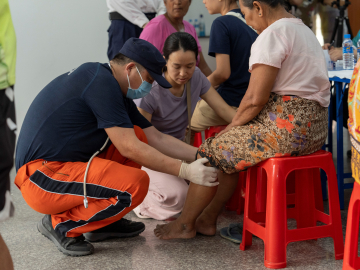Young People with Lived Experience Must Help Shape Mental Health Plans
1 in 7 young people worldwide deals with a mental health issue.
I am one of them.
Knowing firsthand the impact that this can have, I believe that expanded mental health services will fall short unless young people are given a meaningful opportunity to shape them.
For better or worse, obsessive-compulsive disorder and anxiety have been part of my life for several years now. My mother’s own diagnosis of OCD came when I was 12, and it shaped my view of how mental health issues can affect a person and those closest to them. I am fortunate that my parents understand that poor mental health is a legitimate struggle and as a result, I am able to seek professional help and community care.
I started advocating on mental health issues to increase awareness among young people and ensure everyone is afforded the same opportunities for care.
Although understanding of mental health has increased in recent years, we still have a long way to go in in my home country of India and other LMICs. Kings College London researchers estimate 80% of people living with depression are in LMICs and yet most advances made in mental health provision are in the West. For example, last year, Canada formed the Ministry for Mental Health and Addictions, a huge step in understanding how to care and support those who need specialized treatment and provision.
Government decisions are informed by society, so as a society we must demand better. Those with lived experience with mental health issues need to share their ideas on how mental health conditions can be treated more effectively.
I’m not writing this to condemn India and its health services because there is support available, and that can only be a good thing. India’s Mental Healthcare Act of 2017 made huge strides in acknowledging the need for increased support, but it failed to consider how policies would become actions. Globally, fewer than 60% of countries have mental health policies, but that percentage drops to 47.8% and 48.1% in African and Western Pacific Regions, respectively. This divide between the Global North and South must be addressed through increased collaboration on program design, implementation, and dealing with challenges.
Countries offering mental health promotion and prevention programs have increased, from 41% in 2014 to 52% in 2020. And while it’s fantastic to see progress, it’s frustrating to see how long it’s taking and the lack of impact. With 27% of programs lacking a defined plan, and 39% having no documented evidence of impact, simple steps can be taken to improve services.
Insights from young people living with mental health diagnoses can help create a system that addresses the key issues that are usually overlooked by theoretical discussions:
- Designing programs that address these health concerns and track progress against key metrics such as accessibility, participant retention, and participant satisfaction.
- Funding and new ways for community care must be created to reach all people, including a mix of online and in-person services. Trained and certified mental health support staff must also be available in community and low-cost settings.
- We must move away from a tokenistic approach to youth engagement and instead explore a whole-society approach that gives young people with lived experience a seat at the table.
Organizations such as Fondation Botnar are working with youth advocates to facilitate discussions between young people and those with the power. Indeed, it’s thanks to my collaboration with such organizations that I’ll speak at the World Health Summit next week in Berlin, raising awareness of this key issue and outlining the urgency of this global mental health crisis—putting my words into action.
I firmly believe that the lack of youth participation is a reason for the perpetuating and increasing mental health crisis. At the World Health Summit, I will call on global leaders to create youth advisory boards for those with lived experience to provide feedback on the current successes and failings of national mental health plans and help design news ones.
Young people like me can provide unparalleled insight, but only if we are given the opportunity to share our unique expertise and experience—without us, programs designed to ensure our mental and physical health will fall flat.
Manvi Tiwari, 19, is a mental health advocate living in India and one of the youngest speakers at this year’s World Health Summit.
Join the 50,000+ subscribers in over 170 countries who rely on Global Health NOW summaries and exclusive articles for the latest public health news. Sign up for our free weekday newsletter, and please share the link with friends and colleagues.
Girls on Nungwi beach in Zanzibar, Tanzania on February 12, 2009. Image: Eric Lafforgue/Gamma-Rapho via Getty




